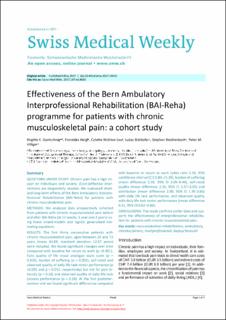Please use this identifier to cite or link to this item:
https://doi.org/10.21256/zhaw-1473Full metadata record
| DC Field | Value | Language |
|---|---|---|
| dc.contributor.author | Gantschnig, Brigitte | - |
| dc.contributor.author | Heigl, Franziska | - |
| dc.contributor.author | Widmer Leu, Colette | - |
| dc.contributor.author | Bütikofer, Lukas | - |
| dc.contributor.author | Reichenbach, Stephan | - |
| dc.contributor.author | Villiger, Peter Matthias | - |
| dc.date.accessioned | 2017-11-08T10:19:23Z | - |
| dc.date.available | 2017-11-08T10:19:23Z | - |
| dc.date.issued | 2017-05 | - |
| dc.identifier.issn | 1424-7860 | de_CH |
| dc.identifier.issn | 1424-3997 | de_CH |
| dc.identifier.issn | 0036-7672 | de_CH |
| dc.identifier.uri | https://digitalcollection.zhaw.ch/handle/11475/1436 | - |
| dc.description.abstract | Questions under study: Chronic pain has a high impact on individuals and society. (Cost-)effective interventions are desperately needed. We evaluated short- and long-term effects of the Bern Ambulatory Interprofessional Rehabilitation (BAI-Reha) for patients with chronic musculoskeletal pain. Methods: We analysed data prospectively collected from patients with chronic musculoskeletal pain before and after BAI-Reha (at 12 weeks, 1 year and 2 years) using linear mixed-models and logistic generalised estimating equations. Results: The first thirty consecutive patients with chronic musculoskeletal pain, aged between 20 and 73 years (mean 44.83, standard deviation 12.57 years) were included. We found significant changes over time compared with baseline for return to work (p <0.001), Euro quality of life visual analogue scale score (p = 0.026), burden of suffering (p = 0.001), self-rated and observed quality of daily life task motor performance (p <0.001 and p = 0.012, respectively) but not for pain intensity (p = 0.16) and observed quality of daily life task process performance (p = 0.28). At the first postintervention visit we found significant differences compared with baseline in return to work (odds ratio 5.26, 95% confidence interval [CI] 1.80–15.39], burden of suffering (mean difference 5.26, 95% CI 2.09–8.44], self-rated quality (mean difference 2.31, 95% CI 1.57–3.05) and satisfaction (mean difference 2.80, 95% CI 1.95-3.66) with daily life task performance, and observed quality with daily life task motor performance (mean difference 0.31, 95% CI 0.02–0.60). Conclusions: This study confirms earlier data and supports the effectiveness of interprofessional rehabilitation for patients with chronic musculoskeletal pain. | de_CH |
| dc.language.iso | en | de_CH |
| dc.publisher | EMH Schweizerischer Ärzteverlag | de_CH |
| dc.relation.ispartof | Swiss Medical Weekly | de_CH |
| dc.rights | https://creativecommons.org/licenses/by-nc-nd/4.0/ | de_CH |
| dc.subject | Ergotherapie | de_CH |
| dc.subject | Musculoskeletal rehabilitation | de_CH |
| dc.subject | Multiprofessional | de_CH |
| dc.subject | Occupational therapy | de_CH |
| dc.subject.ddc | 362: Gesundheits- und Sozialdienste | de_CH |
| dc.subject.ddc | 616.7: Krankheiten des Bewegungsapparates und Orthopädie | de_CH |
| dc.title | Effectiveness of the Bern Ambulatory Interprofessional Rehabilitation (BAI-Reha) programme for patients with chronic musculoskeletal pain : a cohort study | de_CH |
| dc.type | Beitrag in wissenschaftlicher Zeitschrift | de_CH |
| dcterms.type | Text | de_CH |
| zhaw.departement | Gesundheit | de_CH |
| zhaw.organisationalunit | Institut für Ergotherapie (IER) | de_CH |
| dc.identifier.doi | 10.4414/smw.2017.14433 | de_CH |
| dc.identifier.doi | 10.7892/boris.101037 | de_CH |
| dc.identifier.doi | 10.21256/zhaw-1473 | - |
| dc.identifier.pmid | 28488263 | de_CH |
| zhaw.funding.eu | No | de_CH |
| zhaw.originated.zhaw | Yes | de_CH |
| zhaw.publication.status | publishedVersion | de_CH |
| zhaw.publication.review | Peer review (Publikation) | de_CH |
| Appears in collections: | Publikationen Gesundheit | |
Files in This Item:
| File | Description | Size | Format | |
|---|---|---|---|---|
| 2017_gantschnig_BAI-Reha_SwissMedicalWeekly.pdf | 927.29 kB | Adobe PDF |  View/Open |
Show simple item record
Gantschnig, B., Heigl, F., Widmer Leu, C., Bütikofer, L., Reichenbach, S., & Villiger, P. M. (2017). Effectiveness of the Bern Ambulatory Interprofessional Rehabilitation (BAI-Reha) programme for patients with chronic musculoskeletal pain : a cohort study. Swiss Medical Weekly. https://doi.org/10.4414/smw.2017.14433
Gantschnig, B. et al. (2017) ‘Effectiveness of the Bern Ambulatory Interprofessional Rehabilitation (BAI-Reha) programme for patients with chronic musculoskeletal pain : a cohort study’, Swiss Medical Weekly [Preprint]. Available at: https://doi.org/10.4414/smw.2017.14433.
B. Gantschnig, F. Heigl, C. Widmer Leu, L. Bütikofer, S. Reichenbach, and P. M. Villiger, “Effectiveness of the Bern Ambulatory Interprofessional Rehabilitation (BAI-Reha) programme for patients with chronic musculoskeletal pain : a cohort study,” Swiss Medical Weekly, May 2017, doi: 10.4414/smw.2017.14433.
GANTSCHNIG, Brigitte, Franziska HEIGL, Colette WIDMER LEU, Lukas BÜTIKOFER, Stephan REICHENBACH und Peter Matthias VILLIGER, 2017. Effectiveness of the Bern Ambulatory Interprofessional Rehabilitation (BAI-Reha) programme for patients with chronic musculoskeletal pain : a cohort study. Swiss Medical Weekly. Mai 2017. DOI 10.4414/smw.2017.14433
Gantschnig, Brigitte, Franziska Heigl, Colette Widmer Leu, Lukas Bütikofer, Stephan Reichenbach, and Peter Matthias Villiger. 2017. “Effectiveness of the Bern Ambulatory Interprofessional Rehabilitation (BAI-Reha) Programme for Patients with Chronic Musculoskeletal Pain : A Cohort Study.” Swiss Medical Weekly, May. https://doi.org/10.4414/smw.2017.14433.
Gantschnig, Brigitte, et al. “Effectiveness of the Bern Ambulatory Interprofessional Rehabilitation (BAI-Reha) Programme for Patients with Chronic Musculoskeletal Pain : A Cohort Study.” Swiss Medical Weekly, May 2017, https://doi.org/10.4414/smw.2017.14433.
Items in DSpace are protected by copyright, with all rights reserved, unless otherwise indicated.